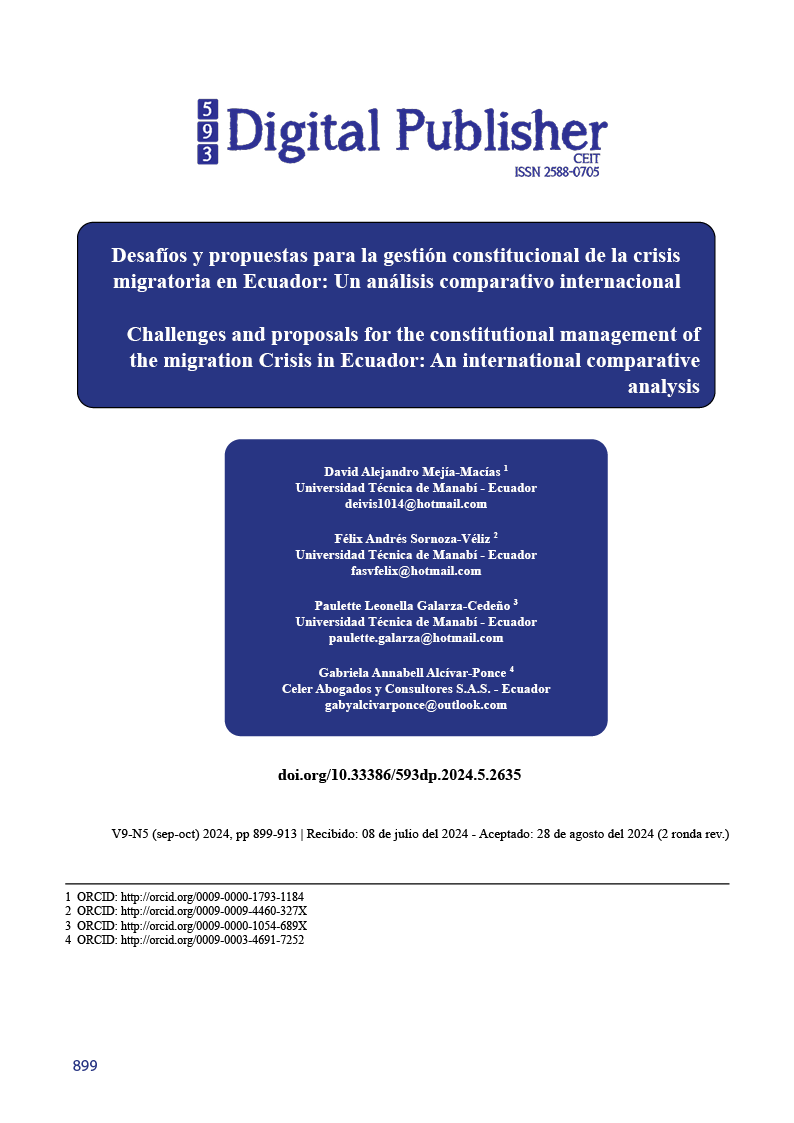Desafíos y propuestas para la gestión constitucional de la crisis migratoria en Ecuador: Un análisis comparativo internacional
Contenido principal del artículo
Resumen
La crisis migratoria contemporánea plantea un desafío significativo para numerosos países, incluido Ecuador, donde el Derecho Constitucional y las políticas migratorias deben adaptarse para gestionar estos fenómenos sin comprometer los derechos humanos. El objetivo del presente estudio fue examinar la capacidad del marco constitucional ecuatoriano para gestionar las crisis migratorias. Se adoptó un enfoque cualitativo exploratorio y descriptivo, analizando exhaustivamente documentos legales y políticas migratorias de Ecuador, complementado con un análisis comparativo de sistemas constitucionales de otros países para identificar buenas prácticas y patrones relevantes. El estudio reveló que, aunque Ecuador posee un marco jurídico sólido respaldado por tratados internacionales, enfrenta desafíos significativos en la implementación de sus políticas migratorias debido a la falta de recursos y coordinación. Análisis comparativos con otros países han demostrado que la coordinación interinstitucional y la asignación adecuada de recursos son esenciales para gestionar eficazmente las crisis migratorias, sugiriendo que Ecuador debe adoptar enfoques similares para mejorar su respuesta y asegurar la protección de los derechos humanos de los migrantes. Se concluye que, a pesar de un marco jurídico robusto, Ecuador enfrenta desafíos significativos en la implementación de políticas migratorias debido a la falta de recursos y coordinación. Se sugiere adoptar estrategias de coordinación interinstitucional y asignación adecuada de recursos, inspiradas en modelos exitosos de otros países, para mejorar la gestión de las crisis migratorias y asegurar la protección de los derechos humanos.
Descargas
Detalles del artículo

Esta obra está bajo una licencia internacional Creative Commons Atribución-NoComercial-CompartirIgual 4.0.
1. Derechos de autor
Las obras que se publican en 593 Digital Publisher CEIT están sujetas a los siguientes términos:
1.1. 593 Digital Publisher CEIT, conserva los derechos patrimoniales (copyright) de las obras publicadas, favorece y permite la reutilización de las mismas bajo la licencia Licencia Creative Commons 4.0 de Reconocimiento-NoComercial-CompartirIgual 4.0, por lo cual se pueden copiar, usar, difundir, transmitir y exponer públicamente, siempre que:
1.1.a. Se cite la autoría y fuente original de su publicación (revista, editorial, URL).
1.1.b. No se usen para fines comerciales u onerosos.
1.1.c. Se mencione la existencia y especificaciones de esta licencia de uso.
Citas
Adam, H. (2015). Xenophobia, Asylum Seekers, and Immigration Policies in Germany. Nationalism and Ethnic Politics, 21(4), 446–464. https://doi.org/10.1080/13537113.2015.1095528
Arteaga Alcívar, Y. A. (2024). La regularización migratoria: ¿Por qué fracasa la política de regularización migratoria? Caso: Ecuador 2008-2020 [Flacso Ecuador]. https://repositorio.flacsoandes.edu.ec/handle/10469/21053
Basaran, T. (2010). Security, Law and Borders. Routledge. https://doi.org/10.4324/9780203841921
Basok, T., & Rojas Wiesner, M. L. (2018). Precarious legality: regularizing Central American migrants in Mexico. Ethnic and Racial Studies, 41(7), 1274–1293. https://doi.org/10.1080/01419870.2017.1291983
Becker, E. (2024). Migration and Cultural Integration in Germany. International Journal of Sociology, 8(2), 25–35. https://doi.org/10.47604/ijs.2590
Benhabib, S. (2020). The End of the 1951 Refugee Convention? Dilemmas of Sovereignty, Territoriality, and Human Rights. Jus Cogens, 2(1), 75–100. https://doi.org/10.1007/s42439-020-00022-1
Bojorquez-Chapela, I., Infante, C., Larrea-Schiavon, S., & Vieitez-Martinez, I. (2021). In-Transit Migrants And Asylum Seekers: Inclusion Gaps In Mexico’s COVID-19 Health Policy Response. Health Affairs, 40(7), 1154–1161. https://doi.org/10.1377/hlthaff.2021.00085
Castles, S. (2000). International Migration at the Beginning of the Twenty‐First Century: Global Trends and Issues. International Social Science Journal, 52(165), 269–281. https://doi.org/10.1111/1468-2451.00258
Castles, S. (2004). The Factors that Make and Unmake Migration Policies. International Migration Review, 38(3), 852–884. https://doi.org/10.1111/j.1747-7379.2004.tb00222.x
Cecchini, S., & Martínez, R. (2012). Inclusive Social Protection in Latin America: A Comprehensive, Rights-Based Approach. SSRN Electronic Journal. https://doi.org/10.2139/ssrn.2009321
Cintra, N., Owen, D., & Riggirozzi, P. (2023). Latin American Normative Frameworks of Migration and Asylum. In Displacement, Human Rights and Sexual and Reproductive Health (pp. 64–88). Bristol University Press. https://doi.org/10.51952/9781529222814.ch003
de Haas, H., Czaika, M., Flahaux, M., Mahendra, E., Natter, K., Vezzoli, S., & Villares‐Varela, M. (2019). International Migration: Trends, Determinants, and Policy Effects. Population and Development Review, 45(4), 885–922. https://doi.org/10.1111/padr.12291
De Wit, H., Leal, F., & Unangst, L. (2020). Internationalization aimed at global social justice. ETD - Educação Temática Digital, 22(3), 567–590. https://doi.org/10.20396/etd.v22i3.8659331
Dedios, M. C., & Ruiz, F. (2022). Recent Migration to Peru: The Current Situation, Policy Responses and Opportunities. UNDP Latin America and the Caribbean. https://www.undp.org/sites/g/files/zskgke326/files/2022-10/PNUDLAC-working-paper-35-Peru-EN.pdf
Duarte, M., Lippert-Rasmussen, K., Parekh, S., & Vitikainen, A. (2018). Refugee Crisis: (M. Duarte, K. Lippert-Rasmussen, S. Parekh, & A. Vitikainen, Eds.). Routledge. https://doi.org/10.4324/9781351207553
Eremenko, T., & González‐Ferrer, A. (2018). Transnational families and child migration to France and Spain. The role of family type and immigration policies. Population, Space and Place, 24(7). https://doi.org/10.1002/psp.2163
Falleti, T. G. (2005). A Sequential Theory of Decentralization: Latin American Cases in Comparative Perspective. American Political Science Review, 99(3), 327–346. https://doi.org/10.1017/S0003055405051695
Ferris, E. (2020). Making Sense of Public Policy on Refugee Integration. The ANNALS of the American Academy of Political and Social Science, 690(1), 200–224. https://doi.org/10.1177/0002716220941577
Fischer-Lescano, A., Lohr, T., & Tohidipur, T. (2009). Border Controls at Sea: Requirements under International Human Rights and Refugee Law. International Journal of Refugee Law, 21(2), 256–296. https://doi.org/10.1093/ijrl/eep008
Flemes, D., & Wehner, L. (2015). Drivers of strategic contestation: The case of South America. International Politics, 52(2), 163–177. https://doi.org/10.1057/ip.2014.45
Gericke, D., Burmeister, A., Löwe, J., Deller, J., & Pundt, L. (2018). How do refugees use their social capital for successful labor market integration? An exploratory analysis in Germany. Journal of Vocational Behavior, 105, 46–61. https://doi.org/10.1016/j.jvb.2017.12.002
Giovanis, E., & Akdede, S. H. (2021). Integration Policies in Spain and Sweden: Do They Matter for Migrants’ Economic Integration and Socio-Cultural Participation? SAGE Open, 11(4), 215824402110544. https://doi.org/10.1177/21582440211054476
Gissi, N., Aruj, R., & Polo, S. (2021). Políticas migratorias y cooperación regional en el Cono Sur: gestión institucional de la migración venezolana en Argentina, Chile y Bolivia. Sociedade e Estado, 36(3), 1015–1035. https://doi.org/10.1590/s0102-6992-202136030008
Gurer, C. (2019). Refugee Perspectives on Integration in Germany. American Journal of Qualitative Research, 3(2). https://doi.org/10.29333/ajqr/6433
Herrera, G., & Gómez, C. (2022). Migration in South America (G. Herrera & C. Gómez, Eds.). Springer International Publishing. https://doi.org/10.1007/978-3-031-11061-0
Herrera Mosquera, G., Moncayo, M. I., & Escobar García, A. (2012). Perfil Migratorio del Ecuador, 2011. Organización Internacional para las Migraciones (OIM). https://repository.iom.int/handle/20.500.11788/1386
Hinger, S., & Schweitzer, R. (2020). Politics of (Dis)Integration (S. Hinger & R. Schweitzer, Eds.). Springer International Publishing. https://doi.org/10.1007/978-3-030-25089-8
Ho, S., Javadi, D., Causevic, S., Langlois, E. V, Friberg, P., & Tomson, G. (2019). Intersectoral and integrated approaches in achieving the right to health for refugees on resettlement: a scoping review. BMJ Open, 9(7), e029407. https://doi.org/10.1136/bmjopen-2019-029407
Horn, P., & Grugel, J. (2018). The SDGs in middle-income countries: Setting or serving domestic development agendas? Evidence from Ecuador. World Development, 109, 73–84. https://doi.org/10.1016/j.worlddev.2018.04.005
Huot, S., Laliberte Rudman, D., Dodson, B., & Magalhães, L. (2013). Expanding Policy-Based Conceptualizations of ‘Successful Integration’: Negotiating Integration through Occupation following International Migration. Journal of Occupational Science, 20(1), 6–22. https://doi.org/10.1080/14427591.2012.717497
Hurtado Lomas, C. R., Chamorro Valencia, D. X., & Acosta Vizcaino, G. A. (2022). Estrategias jurídico-sociales para asegurar la integridad de niños, niñas y adolescentes no acompañados en procesos migratorios y que ingresan al Ecuador [Informe final de proyecto de investigación previo a la obtención del título de Abogada, Universidad Regional Autónoma de los Andes]. https://dspace.uniandes.edu.ec/handle/123456789/15267
Jacovkis, J., Montes, A., & Rambla, X. (2022). When Arriving Is Not Enough—Constraints in Access to Education and Employment Opportunities for Migrant Youth. Societies, 12(3), 95. https://doi.org/10.3390/soc12030095
Kaushik, V., & Drolet, J. (2018). Settlement and Integration Needs of Skilled Immigrants in Canada. Social Sciences, 7(5), 76. https://doi.org/10.3390/socsci7050076
Kotabe, M., Teegen, H., Aulakh, P. S., Coutinho de Arruda, M. C., Santillán–Salgado, R. J., & Greene, W. (2000). Strategic alliances in emerging Latin America: a view from Brazilian, Chilean, and Mexican companies. Journal of World Business, 35(2), 114–132. https://doi.org/10.1016/S1090-9516(00)00028-6
Kotzur, M., Moya, D., Sözen, Ü. S., & Romano, A. (Eds.). (2020). The External Dimension of EU Migration and Asylum Policies. Nomos Verlagsgesellschaft mbH & Co. KG. https://doi.org/10.5771/9783845298375
Lin, X. (2010). The diaspora solution to innovation capacity development: Immigrant entrepreneurs in the contemporary world. Thunderbird International Business Review, 52(2), 123–136. https://doi.org/10.1002/tie.20319
Martin, S. F. (2018). Forced Migration and Refugee Policy. In Demography of Refugee and Forced Migration (pp. 271–303). Springer International Publishing. https://doi.org/10.1007/978-3-319-67147-5_14
Martínez Rojas, D., Muñoz Henríquez, W., & Mondaca Rojas, C. (2021). Racism, Interculturality, and Public Policies: An Analysis of the Literature on Migration and the School System in Chile, Argentina, and Spain. SAGE Open, 11(1), 215824402098852. https://doi.org/10.1177/2158244020988526
Martins, A. de F. H., & Xavier, W. S. (2021). Refugees right to work: the characteristics of Brazilian migration policies from the end of World War II to 2019. Cadernos EBAPE.BR, 19(2), 325–337. https://doi.org/10.1590/1679-395120200028
Mercure, J.-F., Paim, M. A., Bocquillon, P., Lindner, S., Salas, P., Martinelli, P., Berchin, I. I., de Andrade Guerra, J. B. S. O., Derani, C., de Albuquerque Junior, C. L., Ribeiro, J. M. P., Knobloch, F., Pollitt, H., Edwards, N. R., Holden, P. B., Foley, A., Schaphoff, S., Faraco, R. A., & Vinuales, J. E. (2019). System complexity and policy integration challenges: The Brazilian Energy- Water-Food Nexus. Renewable and Sustainable Energy Reviews, 105, 230–243. https://doi.org/10.1016/j.rser.2019.01.045
Natter, K., & Thiollet, H. (2023). Migration Politics across the World. Routledge. https://doi.org/10.4324/9781003457640
Nicolao, J. (2019). Los migrantes regionales en Bahía Blanca, Argentina: Desafíos en el acceso a derechos sociales. Estudios Fronterizos, 20. https://doi.org/10.21670/ref.1903024
Noy, S., & Voorend, K. (2016). Social Rights and Migrant Realities: Migration Policy Reform and Migrants’ Access to Health Care in Costa Rica, Argentina, and Chile. Journal of International Migration and Integration, 17(2), 605–629. https://doi.org/10.1007/s12134-015-0416-2
Olayo-Méndez, A., Haymes, S. N., & Vidal de Haymes, M. (2014). Mexican Migration-Corridor Hospitality. Peace Review, 26(2), 209–217. https://doi.org/10.1080/10402659.2014.906887
Otero, G. A. P., & Lotta, G. S. (2020). International Migration and Federative Co-ordination in Brazil: São Paulo and Porto Alegre Case Studies between 2013 and 2016. Contexto Internacional, 42(2), 277–301. https://doi.org/10.1590/s0102-8529.2019420200004
Panchi Sangoquiza, W. D. (2023). El rol de las organizaciones no gubernamentales en la garantía de los derechos humanos de los migrantes venezolanos en Ecuador entre 2017-2021 [Tesis de maestría, Flacso Ecuador]. https://repositorio.flacsoandes.edu.ec/handle/10469/19145
Paquet, M., & Xhardez, C. (2020). Immigrant integration policies when regions decide ‘who comes in’: the case of Canadian provinces. Regional Studies, 54(11), 1519–1534. https://doi.org/10.1080/00343404.2020.1808881
Pozo Serrano, P. (2019). El Pacto Mundial sobre los refugiados: límites y contribución a la evolución del derecho internacional de los refugiados. Revista Electrónica de Estudios Internacionales, 38. https://doi.org/10.17103/reei.38.03
Ramos-Rodríguez, R., Dufraix-Tapia, R., & A. Brandariz, J. (2021). Heterogeneous borders: migrant workers in Northern Chile. In Handbook of Migration and Global Justice. Edward Elgar Publishing. https://doi.org/10.4337/9781789905663.00012
Reitz, J. G. (2012). The distinctiveness of Canadian immigration experience. Patterns of Prejudice, 46(5), 518–538. https://doi.org/10.1080/0031322X.2012.718168
Romero, L. D., Padilla, J. J., Palacio, K., & Frydenlund, E. (2024). Mapping cooperation: insights into Colombia’s humanitarian response to migration from Venezuela. Frontiers in Human Dynamics, 6. https://doi.org/10.3389/fhumd.2024.1345110
Rosero Martínez, C. G., Rosero Jiménez, C. S., & Laguna Delgado, K. N. (2023). Preservación de derechos humanos en Ecuador: una mirada desde el Derecho Penal. Estudios Del Desarrollo Social: Cuba Y América Latina, 11(1), 288–301. https://revistas.uh.cu/revflacso/article/view/3043
Scholten, P. (2016). Between National Models and Multi-Level Decoupling: The Pursuit of Multi-Level Governance in Dutch and UK Policies Towards Migrant Incorporation. Journal of International Migration and Integration, 17(4), 973–994. https://doi.org/10.1007/s12134-015-0438-9
Simich, L., Beiser, M., Stewart, M., & Mwakarimba, E. (2005). Providing Social Support for Immigrants and Refugees in Canada: Challenges and Directions. Journal of Immigrant and Minority Health, 7(4), 259–268. https://doi.org/10.1007/s10903-005-5123-1
Slominski, P., & Trauner, F. (2018). How do Member States Return Unwanted Migrants? The Strategic (non‐)use of ‘Europe’ during the Migration Crisis. JCMS: Journal of Common Market Studies, 56(1), 101–118. https://doi.org/10.1111/jcms.12621
Solano Pachón, G. A. (2015). Implicaciones de la migración venezolana hacia Colombia: Un desafío a la seguridad nacional. . Perspectivas En Inteligencia, 7(15), 123–142. https://revistascedoc.com/index.php/pei/article/view/239
Sterett, S. (Ed.). (2017). Immigration. Routledge. https://doi.org/10.4324/9781315252599
Stewart, M., Anderson, J., Beiser, M., Mwakarimba, E., Neufeld, A., Simich, L., & Spitzer, D. (2008). Multicultural Meanings of Social Support among Immigrants and Refugees. International Migration, 46(3), 123–159. https://doi.org/10.1111/j.1468-2435.2008.00464.x
Summers, K., Crist, J., & Streitwieser, B. (2022). Education as an Opportunity for Integration: Assessing Colombia, Peru, and Chile’s Educational Responses to the Venezuelan Migration Crisis. Journal on Migration and Human Security, 10(2), 95–112. https://doi.org/10.1177/23315024221085189
Tazreiter, C. (2006). Between state sovereignty and invisibility: monitoring the human rights of returned asylum seekers. Australian Journal of Human Rights, 12(1), 7–25. https://doi.org/10.1080/1323238X.2006.11910811
Thomson, M. S., Chaze, F., George, U., & Guruge, S. (2015). Improving Immigrant Populations’ Access to Mental Health Services in Canada: A Review of Barriers and Recommendations. Journal of Immigrant and Minority Health, 17(6), 1895–1905. https://doi.org/10.1007/s10903-015-0175-3
Thym, D. (2022). The evolution of citizens rights in light of the EUs constitutional development. In D. Kostakopoulou & D. Thym (Eds.), Research Handbook on European Union Citizenship Law and Policy. Edward Elgar Publishing. https://doi.org/10.4337/9781788972901
Vertovec, S. (2022). Superdiversity. Routledge. https://doi.org/10.4324/9780203503577
Vitiello, D. (2022). Comprehensive Approaches in the Global Compact for Migration and the EU Border Policies: A Critical Appraisal. Laws, 11(5), 78. https://doi.org/10.3390/laws11050078
Wood, W. B. (1994). Forced Migration: Local Conflicts and International Dilemmas. Annals of the Association of American Geographers, 84(4), 607–634. https://doi.org/10.1111/j.1467-8306.1994.tb01879.x
Zambrano-Barragán, P., Ramírez Hernández, S., Freier, L. F., Luzes, M., Sobczyk, R., Rodríguez, A., & Beach, C. (2021). The impact of COVID-19 on Venezuelan migrants’ access to health: A qualitative study in Colombian and Peruvian cities. Journal of Migration and Health, 3, 100029. https://doi.org/10.1016/j.jmh.2020.100029
Zapata, G. P., & Tapia Wenderoth, V. (2022). Progressive legislation but lukewarm policies: The Brazilian response to Venezuelan displacement. International Migration, 60(1), 132–151. https://doi.org/10.1111/imig.12902





